Search
Showing 10 of 1867 results for how to register international groups
-
Reconnecting New Zealanders to the world
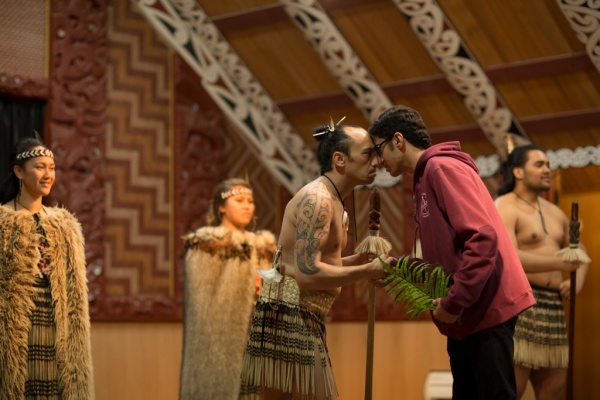
Where does international education fit in?
Prime Minister Jacinda Ardern has announced a plan to reconnect New Zealanders to the world in 2022.
This framework is based on being able to maintain the elimination strategy, alongside a high coverage of vaccination, strong confidence in our system and a phased approach to opening the border.
Read the Prime Minister’s announcement in full | Reconnecting New Zealand to the world on Unite Against COVID-19 site
The key points of this plan are:
- To continue to speed up New Zealand’s vaccination rollout, and move to six weeks between doses so that more New Zealanders have immunity sooner.
- Phased approach to reopening border in the second half of 2021, and set up of new testing and vaccine checking systems at the border.
- Move to new, risk-based border settings that will establish low, medium and high-risk pathways into the country.
New Zealand’s ability to reconnect with the world depends on these factors being successful.
At this early stage, we can’t provide detail or any degree of certainty for students looking to apply for study in or book travel to New Zealand.
Many New Zealand institutions are now offering new ways to study. If you’re wondering which study option might be right for you, visit Study With New Zealand New Ways of Learning.
We suggest that agents, students and their families wait until policy announcements are made before booking any travel to study in New Zealand. We could expect to see more clarity on this later in the year.
FAQs
When will New Zealand open up to the world?
Work continues on developing the requirements for a phased approach to Reconnecting New Zealanders to the rest of the world in 2022. We could expect to see more clarity on this later in 2021.
Read more about the next steps to reconnecting New Zealanders to the world.
What do we know about timeframes for international students returning to New Zealand?
While we are pleased to note that a number of international students have been able to return to New Zealand under the current class exceptions, we aren’t able to provide exact timeframes for a large-scale return for international students and providers.
Managing our border doesn’t mean conditions will stay exactly as they are now, but it does mean that there are likely to be restrictions and requirements in place until at least December 2022.
Can students apply for semester 1 2022 study?
We would currently advise students not to plan for study in New Zealand for semester 1, 2022.
Please note offshore temporary visa application lodgements are currently suspended till February 2022 and this may be extended.
International student class exceptions are a key priority for the Government, but we can’t predict timing on when a further cohort might be announced, or what MIQ capacity may look like at the time.
Will the phased border approach outlined in the Reconnecting New Zealanders to the World announcements affect the temporary suspension of offshore visa application lodgements?
The Government continues work on developing the requirements for a phased approach to Reconnecting New Zealanders to the rest of the world in 2022. As such, no decisions have been made yet on how the border plan might affect offshore visa application lodgements.
What is the Government’s position generally regarding international education?
Despite the severity and complexity of the COVID-19 pandemic, and our ongoing commitment to its elimination strategy, the New Zealand Government remains committed to a thriving international education sector.
In a recent meeting with the international education sector, the Minister of Education highlighted the New Zealand Government’s support for the continued safe return of international students to New Zealand, when the time is right.
How does the border approach affect the students coming into New Zealand under the border exception classes?
It doesn’t. Existing processes for students to enter the country under existing border exception classes (the 250 PhD and postgraduate cohort and the 1000 bachelor's degree and above cohort) will remain in place.
How will New Zealand determine which countries are low, medium or high-risk?
The government is currently working through how it will determine this.
How will the phased border approach affect Managed Isolation and Quarantine (MIQ)?
Vaccinated travellers from low-risk countries will not be required to go through managed isolation facilities.
Vaccinated travellers from medium-risk countries will have modified isolation requirements, the details of which are still to be worked through.
Unvaccinated travellers and all travellers from high-risk countries will need to undergo 14 days in MIQ.
Read more on the next steps of reconnecting New Zealanders to the world
Would lockdowns in New Zealand affect the timing of the phased border approach?
The New Zealand Government is committed to the elimination strategy and the successful rollout of vaccines. New Zealand’s border approach depends on our ability to stamp out clusters of COVID-19 as they arise, so there is some possibility that further lockdowns may delay the border approach.
Will international students in New Zealand continue to receive free COVID-19 healthcare?
Yes. Vaccines are available to everyone in New Zealand (12 years and over) free of charge. This includes international students.
Read more about the COVID-19 vaccine rollout on the Ministry of Health website.
All publicly funded COVID-19 related care – including testing, treatment and vaccinations – is provided to anyone who needs it, free of charge.
-
Executive team
Amanda Malu | Chief Executive
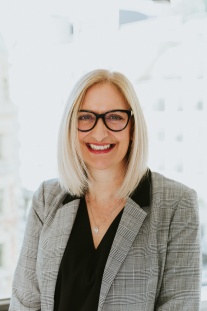 Amanda Malu is the Chief Executive of Education New Zealand Manapou ki te Ao (ENZ).
Amanda Malu is the Chief Executive of Education New Zealand Manapou ki te Ao (ENZ).Amanda has deep experience in the public sector, education, and marketing, as well as experience across borders and with international education through her past roles. She has held senior leadership roles across education and health sectors.
Prior to ENZ, she was Deputy Chief Executive Service Delivery at ACC, and formerly Chief Executive at Whānau Āwhina Plunket, leading the organisation through extensive change over five years in the role. She has also held senior marketing and communication roles, including at the Tertiary Education Commission and in the vocational education sector.
As ENZ’s Chief Executive, Amanda is responsible for leading ENZ in promoting Aotearoa New Zealand as a study destination and helping our country realise the social, cultural, and economic benefits of international education.
Julia Wootton | Group General Manager, Strategy, Capability & Performance
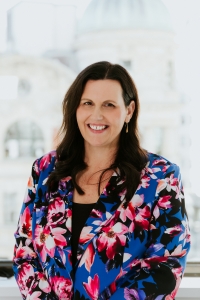 Julia has 25 years of experience in the New Zealand public sector, where she has held senior leadership roles accountable for planning and performance, enabling services, service delivery operations, transformation programmes, and regulators.
Julia has 25 years of experience in the New Zealand public sector, where she has held senior leadership roles accountable for planning and performance, enabling services, service delivery operations, transformation programmes, and regulators. Julia leads the ENZ teams responsible for strategy, governance, accountability and performance, business planning, people and capability, information technology, property, security, risk, data and insights, and finance.
She is passionate about using her understanding of organisational architecture and effective enterprise systems to create settings that enable people to thrive and contribute at their best. Her aim is to ensure ENZ has the right direction, capabilities, and enablers to maximise the impact of its activities and support the international education sector to grow and prosper.
Julia values education and continuous learning and holds a Master of Business Administration and an Executive Master of Public Administration from Te Herenga Waka – Victoria University of Wellington.
Sahinde Pala l Group General Manager, International & Sector Engagement
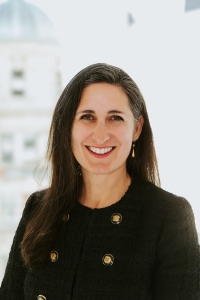 Sahinde joined ENZ in 2016 after 18 years working for a multinational group of English language schools. With a career dedicated to international education, she brought extensive private sector experience in international marketing, stakeholder engagement and student experience delivery to the organisation.
Sahinde joined ENZ in 2016 after 18 years working for a multinational group of English language schools. With a career dedicated to international education, she brought extensive private sector experience in international marketing, stakeholder engagement and student experience delivery to the organisation.Sahinde has held a number of roles at ENZ working with education providers, government stakeholders, regional groups, peak bodies, students’ associations and community groups. She was heavily involved in developing the International Student Wellbeing Strategy.
Sahinde is based in our Auckland office and spends her time outside of work standing on the sidelines of sports fields supporting her young boys.
Anna Gestro | Group General Manager, International Marketing, Brand & Scholarships
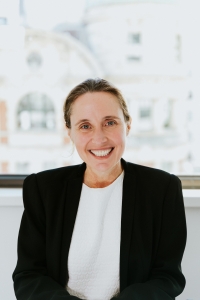 Anna leads the strategy, delivery, and teams behind ENZ's global marketing, brand, and scholarships — focused on connecting students with opportunity and Aotearoa with the world. Her focus is on elevating Aotearoa's global brand, deepening student connection, and driving growth through impactful storytelling and strategic partnerships.
Anna leads the strategy, delivery, and teams behind ENZ's global marketing, brand, and scholarships — focused on connecting students with opportunity and Aotearoa with the world. Her focus is on elevating Aotearoa's global brand, deepening student connection, and driving growth through impactful storytelling and strategic partnerships.Her career spans over 20 years across marketing, strategy, and executive leadership in both public and private sectors. She has worked across global brand and commercial programmes for organisations such as Lion, Fonterra, and New Zealand Cricket — blending deep consumer insight with strategic delivery.
Anna’s experience also includes international roles in Singapore and New York, where she’s helped promote New Zealand’s innovation, values, and capability globally.
Anna is also a board member of Basketball New Zealand, where she brings her commercial and strategic expertise to the development of sport. Across both sport and education, she sees a common thread: the power to unlock opportunity, level the playing field, and connect people across borders and backgrounds.
Ed Tuari l Chief Advisor Māori
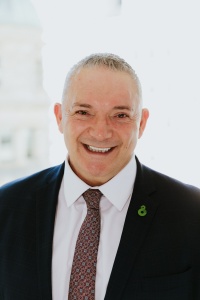 Ed is of Ngāti Porou and Te Whanau-ā-Apanui descent, and joined Education New Zealand Manapou ki te Ao in 2017. He previously worked in Dubai, United Arab Emirates for 18 years.
Ed is of Ngāti Porou and Te Whanau-ā-Apanui descent, and joined Education New Zealand Manapou ki te Ao in 2017. He previously worked in Dubai, United Arab Emirates for 18 years.As Manukura, Ed develops and leads the Rautaki Māori (ENZ’s Māori Strategy), provides advice regarding cultural capability, and brings a Māori perspective to policy and project development.
A former primary school teacher for 10 years, Ed has experience in providing Māori bi-lingual and immersion learning within the New Zealand primary school sector. He also co-wrote and co-presented the first Māori language television programme for preschoolers for mainstream New Zealand television.
In 2012, Ed was named New Zealander of the Year in the United Arab Emirates by AIG, for his cultural and professional contribution to the New Zealand community in Dubai and throughout the Middle East. Recently Ed was the Kaipupuri-Cultural Advisor of the Aotearoa New Zealand Pavilion, entrusted with Kaitiaki o te mouri for Expo 2020 Dubai.
A graduate of Auckland University of Technology, Ed holds a degree in Māori Development, Language and Culture and a Diploma in Teaching.
Ed enjoys engaging in indigenous development initiatives, working towards the preservation and maintenance of tribal culture and heritage, and indigenous networking.
-
Our Board
Tony Gray | Acting Chair
 Tony Gray has had a career in education spanning over 37 years across New Zealand and the United Kingdom. Tony is a former Chief Executive of NMIT and Ara Institute of Technology.
Tony Gray has had a career in education spanning over 37 years across New Zealand and the United Kingdom. Tony is a former Chief Executive of NMIT and Ara Institute of Technology. He is currently the Chief Executive of Nelson Tasman Hospice Trust. His governance portfolio includes Chair of the Tertiary Accord of New Zealand, where he worked towards establishing a shared online learning platform across member institutes. In 2023, Tony was appointed as a Member of the New Zealand Order of Merit for his services to education.
Daniel Wilson | Board Member
 Daniel Wilson started his career in Auckland as a music teacher. After positions at several schools in Auckland and London, Daniel was appointed to the Leadership team at Manurewa High School in 2007, firstly as Deputy, then Associate Principal.
Daniel Wilson started his career in Auckland as a music teacher. After positions at several schools in Auckland and London, Daniel was appointed to the Leadership team at Manurewa High School in 2007, firstly as Deputy, then Associate Principal.In 2015, Daniel moved to Nelson to take up the position of Principal at Nayland College. Daniel has extensive knowledge of international education from a secondary perspective, with Nayland College hosting approximately 80 international students from around the globe in 2020. Daniel also has a very good understanding of a range of markets and marketing approaches, having overseen a 40% increase in international numbers since joining Nayland College.
As well as leading Nayland College, Daniel is also the Lead Principal and Governance Chairperson for the Top of the South Trades Academy. He has also acted as a Regional Engagement Lead for the recent National Certificate of Educational Achievement (NCEA) review. Over the years Daniel has, and continues to work with various national and regional advisory groups. In his spare time Daniel is an accomplished brass musician, playing trombone in a variety of musical groups around Nelson and serving as President of Nelson City Brass.
Dr Therese Arseneau | Board Member
 Dr Therese Arseneau has wide ranging governance experience including as Chair of the Board of ChristchurchNZ, Ara Institute of Canterbury, Regenerate Christchurch and the Christchurch Symphony Orchestra; and as a Director of J Ballantyne Company Ltd, The Open Polytechnic of New Zealand Ltd, Enterprise North Canterbury and the Social Sciences Research Council of Canada.
Dr Therese Arseneau has wide ranging governance experience including as Chair of the Board of ChristchurchNZ, Ara Institute of Canterbury, Regenerate Christchurch and the Christchurch Symphony Orchestra; and as a Director of J Ballantyne Company Ltd, The Open Polytechnic of New Zealand Ltd, Enterprise North Canterbury and the Social Sciences Research Council of Canada.Therese has over 30 years’ experience in the tertiary education sector, including as a university lecturer in Canada and New Zealand. A specialist in elections and New Zealand politics, she is currently an Adjunct Senior Fellow in Political Science at the University of Canterbury and in 2011 she received a UC Teaching Award for excellence in teaching. Therese holds a DPhil and MPhil from the University of Oxford, which she attended as an international student and Commonwealth Scholar.
Dr Erik Lithander | Board Member
 Dr Erik Lithander has had a career in higher education spanning over 20 years across New Zealand, the United Kingdom, Ireland and Australia. He is a former Pro Vice-Chancellor and Vice-President (International and Outreach) at the Australian National University in Canberra and Director of International Affairs at University College Dublin.
Dr Erik Lithander has had a career in higher education spanning over 20 years across New Zealand, the United Kingdom, Ireland and Australia. He is a former Pro Vice-Chancellor and Vice-President (International and Outreach) at the Australian National University in Canberra and Director of International Affairs at University College Dublin.Dr Lithander is currently the Deputy Vice-Chancellor Strategic Engagement at the University of Auckland. Prior to commencing this role in 2021, he was the Pro Vice-Chancellor and Vice-President (Global Engagement) at the University of Bristol in the United Kingdom. Dr Lithander has an internationally focused governance portfolio, with oversight of the Auckland Confucius Institute and previously the North Asia CAPE (Centre for Asia Pacific Excellence). He also is Chair of the Advisory Boards for the New Zealand Centre at Peking University and the New Zealand Centre at the Indian Institute of Technology (Delhi).
Prabha Ravi | Board Member
 Prabha Ravi QSM, JP is an experienced governance leader and international education specialist with over 25 years in senior management roles, including International Director at Waiariki Institute of Technology and YMCA Central, and Senior Manager at Education New Zealand Manapou ki te Ao. She has represented New Zealand in more than 47 countries, generating millions in export education earnings and building strong global partnerships.
Prabha Ravi QSM, JP is an experienced governance leader and international education specialist with over 25 years in senior management roles, including International Director at Waiariki Institute of Technology and YMCA Central, and Senior Manager at Education New Zealand Manapou ki te Ao. She has represented New Zealand in more than 47 countries, generating millions in export education earnings and building strong global partnerships.With nearly 20 years of governance experience across the arts, sports, education, health, community, and public sectors, Prabha serves on several boards, including the Wellington/Wairarapa Lotteries Committee.
She is also the founder and director of Natraj School of Dance, a leading Indian classical dance institution in Wellington for over 25 years, and an award-winning actor. Her contributions to education, arts, governance, and ethnic communities have been recognised with multiple honours, including the Queen’s Service Medal in 2017.
Sara Brownlie | Board Member
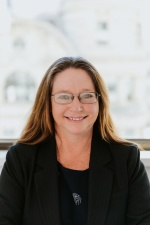 Sara Brownlie is a chartered accountant and chartered director with strong risk and financial management and financial planning knowledge. She has worked in the public sector for most of her career in senior financial roles including Department of Internal Affairs, Ministry of Justice and at Treasury where she was also Chief Financial Officer for the Department of Prime Minister and Cabinet and for the Public Services Commission. This followed early career at Deloitte and Unilever.
Sara Brownlie is a chartered accountant and chartered director with strong risk and financial management and financial planning knowledge. She has worked in the public sector for most of her career in senior financial roles including Department of Internal Affairs, Ministry of Justice and at Treasury where she was also Chief Financial Officer for the Department of Prime Minister and Cabinet and for the Public Services Commission. This followed early career at Deloitte and Unilever. Sara now provides specialist strategic financial and project/programme advisory services through her company Fargher Woods Ltd. Sara is a board member with Catalyst.net and is the Crown appointed Deputy Chair and Chair of the Finance and Audit Committee of the Research Education Advanced Network New Zealand (REANNZ). She is also an independent member of Enable New Zealand Finance, Risk and Audit Committee, and holds a similar role with the Upper Hutt City Council's Risk and Assurance Committee.
-
Putting New Zealand in agents’ hearts and on their maps
Education New Zealand (ENZ) recently organised a series of agent familiarisation tours.
Four groups were immersed in New Zealand’s learning, living and working opportunities for international students.
Agents from Brazil, Colombia, South Korea and Saudi Arabia were treated to tours of New Zealand’s special places – from regional centres to our bigger cities.
ENZ’s regional and international teams organised the programmes and toured with the agents over May and June. They were shown the full spectrum of the sector, and were also given updates and presentations from government agencies like Immigration New Zealand and the New Zealand Qualifications Authority (NZQA.
“The agents enjoyed and appreciated the chance to learn about education in New Zealand, meet current international students and understand the distinctive offerings for students across all of New Zealand,” said Greg Scott, ENZ Regional Programme Manager.
The tour included interactive activities, including an emphasis on education pathways, applied learning and creative technologies, and special open-invitation networking opportunities, like the Networking Starts at Home event
The agents visited Taranaki, Nelson, Canterbury, Waiuku, Hamilton, Dunedin, Queenstown and Napier.

COLOMBIAN AGENTS SARA GAMEZ AND ANA KARINA FAJARDIO ENJOY TIME AT AUT BY THE NGA WAI O HOROTIU MARAE
“As our regional centres become better known international education destinations, the agent familiarisation tours demonstrated how each regional centre has a unique story and value proposition that can appeal to different student interests,” says Greg Scott.
The potential benefit to increasing the profile of New Zealand education amongst all these markets is immense.
“The feedback from the participating agents was extremely positive and heartfelt,” says Sarah Gauthier, ENZ Regional Project Manager.
“We ensured the agents enjoyed themselves and their time in New Zealand. They enjoyed tourist activities, speaking to international students and their homestay families and gaining a deeper understanding overall of the value of a New Zealand education.”
“We are seeing lots of photos of New Zealand on the agents’ social media feeds and their agencies’ websites,” says Jo Keane, ENZ Regional Project Manager.
“We’d like to thank all the people, organisations and regional groups that supported these familiarisations,” says Sarah Gauthier.
“It was a true Team New Zealand effort. We appreciated the time everyone took to host us, meet the agents, organise tours and ensure that the students were available to speak to the agents in their own language.
“There’s nothing like hearing why New Zealand is such a great place to be a student than from real international students. By speaking about their study, lifestyle and work opportunities, the tours were really brought to life,” she says.
KOREAN AGENTS ENJOY THE NELSON SUNSHINE
-
Pakistani student leverages language skills to connect communities
Fluent in Punjabi, Urdu, and English, and passionate about community service, Usma soon became a key player working to support and connect ethnic communities in Christchurch.
So extensive have her achievements been, that she has been honoured by the university with a coveted Blues Award for community engagement, and by the Christchurch City Council with a Civic Award.
Usma arrived in New Zealand in late 2016 and gave birth to her third child shortly after arriving. “It gave me the time I needed to assess society here, and I realised the value that was placed on volunteer work.”
New Zealand values transferable skills
“My background was in teaching and ESOL (English for Speakers of Other Languages) instruction. I did teach here when I first arrived, but it was not fulfilling enough,” she says. “I needed to think what other skills I had to offer in an area of work I was passionate about. New Zealand is not a destination of degrees, it is a destination of skills, where whatever transferable skills you have to offer, are valued.”
She initially got involved in UC’s Pakistani Student Association, planning events which quickly extended beyond the student community. “I got great feedback from the wider community and different ethnic groups started coming along. People from these communities were looking for connectivity and involvement and it ended up being a multi-cultural hub.”
She admits it was not without challenges, but she was determined. “I was an international student, a woman, a mother of a special needs child, and I was working. But I managed my time. I enjoy doing volunteer work and it comes naturally.”
In her second year at Uni, she secured a role as a Diversity and Engagement Officer with the Ministry of Ethnic Communities and juggled both study and work. It was in this role that she became involved in the Government response following the Christchurch mosque attack in 2019.
Frontline worker following mosque attack
“I was one of the frontline workers dealing with victims and those left behind. Some of my colleagues were victims,” she says. “It was a difficult time. I had never had any exposure to such an event, or what the aftermath might be like. Hearing the stories, and being part of it, are totally different things.”
“I’m very proud of my work and found it very rewarding. I discovered my strengths and weaknesses and learned how much I had to offer. I could speak with many of the widows in the Muslim community in their own language, understand their needs, and advocate on their behalf. I learned how to deliver the key messages to the government agencies involved in the response and formed a link between the two groups.”
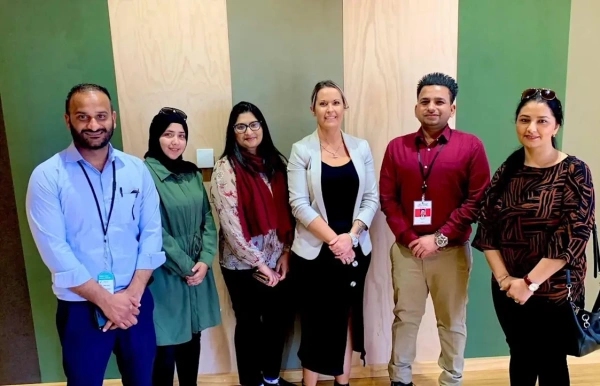
“The migrant communities have so much resilience and I believe that every disaster brings opportunity to come together, to heal, and to grow.”
Usma went on to become involved in Widows of Shuhada – an eight-part Plains FM/RNZ podcast documentary series which followed the journey of four widows following the attack.
Soon after, Covid-19 arrived in New Zealand and Usma worked on engagement with local ethnic communities, translating the Government’s messages and communicating them through a range of digital channels.
Tapping into the skills of international students
But she didn’t stop there. Usma was also influential in Christchurch’s Ethnic Communities Skills Build Programme, a project designed to smooth the pathway of migrants and international students into employment in New Zealand.
International students could join in workshops, meet career counsellors and job brokers from the Ministry of Social Development, reshape their CVs, and attend job fairs.
“I believe we need to tap into the high-level skills of post-graduate international students. We need to progress them in the right direction, utilising their skills in science, technology, and innovation.”
As for her own career, Usma could not be happier. She has secured a full-time role as a policy analyst at the Ministry of Primary Industries in Wellington and has taken a step back from her volunteer work to focus on completing her PhD this year.
She is grateful for the opportunity to study in New Zealand and to bring her family with her. Her husband is working, her children are happy, and her special needs daughter has opportunities she wouldn’t have had in Pakistan.
Usma still acts as a mentor for international students and tells them if they are to make the most of their time in New Zealand, they should “think outside the box”.
“They should think about the skills they have to offer in the community, and they will be rewarded with a transformative experience. Leaving behind the social constraints of your home country can be liberating. It’s all about following your dream.”
Usma says she’s already landed her dream job, but she plans to continue her community work once she has completed her PhD.“I believe it is my contribution to this country and I love doing it. I’m not likely to stop. I’m just settling in, finishing my PhD, and getting ready for something big. I have ambitious plans.”
-
Measles outbreak: information for international students

There is currently an outbreak of measles in New Zealand.
We encourage you to stay up-to-date with the latest advice and information on the measles outbreak by visiting the Ministry of Health’s website here.
Measles is a highly infectious airborne virus and one of the world’s most infectious diseases. It is important that international students get vaccinated at least two weeks before travelling to New Zealand. This allows time for the vaccine to build immunity.
For international students who are currently in New Zealand, it is important to know your vaccination status to know if you are immune. If you do not know your vaccination status, you may wish to ask someone at home to check with your healthcare provider.
It is extremely important to be up-to-date with measles immunisations. This protects the student, their community and anyone they may come into contact with – particularly small babies, pregnant women and others who cannot be vaccinated
One dose of MMR vaccine protects about 95 percent of people, and two doses protects about 99 percent of people. Two doses are necessary to prevent outbreaks.
It is important to note that the Ministry of Health is working closely with District Health Boards in New Zealand to manage the distribution of vaccine stock to ensure they are available to those who need them most. This means that first priority for MMR vaccinations is currently:
Auckland
- Ensuring all children receive their MMR vaccinations on time at 12 months and 4 years to maintain the national Childhood Immunisation Schedule
- Targeted community outreach managed by the three Auckland DHBs, namely groups who are most affected by the outbreak including 15-29 year olds and Pacific peoples within those groups.
Rest of New Zealand
- Ensure all children receive their vaccinations on time at 15 months and 4 years to maintain the national Childhood Immunisation Schedule
- Susceptible close contacts within 72 hours of first exposure to measles when possible.
Symptoms
Symptoms of measles include: a fever; cough; runny nose; sore and watery ‘pink’ eyes and a rash. People are contagious five days before and five days after the appearance of the rash, counting the day of rash onset as day one.
Advice if someone thinks they have measles:
- Stay away from work, school or public places
- Call Healthline on 0800 611 116, to inform them that you are experiencing symptoms of measles and that you may have come into contact with a measles case
- Cover your mouth and nose when coughing or sneezing and wash your hands frequently
- Minimise your contact with others to prevent infecting them
- Students should also make sure other people e.g. flatmates, friends, homestay families or hostel staff are aware they are unwell, so they can assist if needed.
Who shouldn’t get the vaccine?
You shouldn’t get immunised against measles if you:
- Are pregnant
- Have had an anaphylaxis reaction to MMR or are immunocompromised.
If a student thinks they have been exposed to measles and is unable to have the vaccine, they need to ask a doctor for advice.
Pregnant women who think they have measles, or have come in contact with someone with measles, must call their general practice or lead maternity carer as soon as possible. Pregnant women who were immunised against measles prior to becoming pregnant, are almost certainly protected.
More information
All international students must have medical insurance while they are in New Zealand. To find out more about healthcare in New Zealand for international students, go to NauMai NZ.
-
Two new sector-facing leadership roles at ENZ
GM Sector Engagement
We look forward to welcoming Wendy Kerr to Education New Zealand Manapou ki te Ao (ENZ) on 3 October 2022. Ms Kerr will take up the newly-created role of General Manager, Sector Engagement.
Joining us from fintech Valocity where she was Global Chief Operations Officer, Ms Kerr has rich experience in both education and commercial businesses globally.
Prior to Valocity, she was Director of the Centre for Innovation and Entrepreneurship at the University of Auckland. She led the team there to transform the Centre and enabled the University to be recognised as Entrepreneurial University of the Year in the Asia-Pacific.
Ms Kerr is also Board Director for The Icehouse and sits on the Board of Epsom Girls Grammar. Previous roles include General Manager for Pearson PLC London, and Asia-Pacific Marketing Manager for Apple. She has been a TEDx speaker and has published a number one bestseller on Amazon - ‘Corporate Crossovers’. Ms Kerr has a Ngāti Mutunga and Moriori heritage and will be based in our Auckland office.
The Sector Engagement group delivers strategic initiatives in partnership with sector partners and stakeholders, undertakes business development, and designs and delivers new products and services.
GM Sector Services
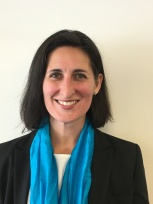 Sahinde Pala was recently appointed to the newly-created role of General Manager, Sector Services.
Sahinde Pala was recently appointed to the newly-created role of General Manager, Sector Services.Ms Pala joined ENZ in 2016 after 18 years working for a multinational group of English language schools. With a career dedicated to international education, she brought extensive private sector experience in international marketing, stakeholder engagement and student experience delivery to the organisation.
Ms Pala has held a number of roles at ENZ working with education providers, government stakeholders, regional groups, peak bodies, students’ associations and community groups. She was heavily involved in developing the International Student Wellbeing Strategy.
With a passion for delivering an excellent customer experience, Ms Pala will be leading the newly formed Sector Services team to deliver a suite of products and services that support the sector to rebuild and thrive. This includes student experience, global citizenship, global events, and agent engagement, as well as scholarships to support domestic students to have an international education experience, and international students to study in New Zealand.
Sahinde is based in our Auckland office and spends her time outside of work standing on the sidelines of sports fields supporting her young boys.
View all senior leadership team members here.
-
Japanese students join Kiwi flight school
The students came from Kinjo Gakuin University in Nagoya, Japan and studied a short course specially designed for them. In addition to New Zealand School of Tourism’s flight attending course, they also had a session from Cut Above Academy about hair and makeup training, as immaculate grooming is an essential part of the job.
Shizuko Ozaki, a teacher from Kinjo Gakuin University, said the girls loved their time at the airport campus, and were impressed with the school’s facilities – including offering training onboard a real plane.
“They enjoyed the hands-on learning and the practical aspect of the training on the 737 aircraft. The trainer was fantastic with our students, she made the learning easy for them to understand and follow. They also enjoyed interacting with the other classes and they felt very comfortable and welcomed on campus.”
New Zealand School of Tourism frequently creates bespoke programmes for international groups.
New Zealand student Armani Young said having international groups at the college was a bonus for everyone involved. She said it gave the trainers the opportunity to learn about other cultures, and the international students the chance to experience life in New Zealand.
“Our class also loved interacting with the Japanese group. They were quiet and shy at first, but soon became comfortable and had fun interacting with us. It was great to share our culture with them.”
-
Schools: roadmap workshop summary
Download the school sector summary paper.
ENZ is facilitating the Strategic Roadmap programme to help each sector, and New Zealand’s international education industry overall, to outline what success will look like in the future and develop a plan to get there.
Everyone, regardless of whether you attended the workshop, is invited and encouraged to read the summary document and send comments, questions or ideas to Greg Scott, Project Manager for the school sector.
Greg, who has been seconded from Middleton Grange School for this project, says the workshops were designed as the first of many opportunities for schools to provide input into the Strategic Roadmap process.
“During the workshops, participants reported a wide range of motivations for and benefits from enrolling international students. An exciting array of ideas emerged of what might be possible by 2025 – our roadmap destination – and the workshops demonstrated that our sector has the vision and ideas required to make a significant difference in the next 10 years.”
Greg says he was particularly impressed by the high level of creative thought: “The ideas put forward by the participants are well worth reading and reflecting on.”
Advisory Groups have been formed for each sector to provide advice and feedback to Project Managers and the sector roadmap development team during the roadmap process. These groups are tasked with representing the views of the sector throughout the process, and will also act as a communications conduit between their sector and project managers.
-
Opening new doors for Chilean teachers of English
Two groups of 20 Chilean teachers of English recently spent time at two New Zealand universities, studying diversity and inclusion in the classroom and learning more about the Kiwi style of teaching.
The first cohort, from Chile’s Araucania region, went to the University of Waikato’s Institute of Professional Learning. They were the third group of teachers funded to travel here by Araucanian local government.
University of Waikato Associate Director of International Education and Development, Chris Henderson, describes their programme as “genuinely collaborative”.
“As our relationship with the Chilean Ministry of Education has developed, we progressed from delivering an off-the-shelf programme to co-creating a teacher development intitiative that is bespoke and unique to Chilean teachers’ needs,” he says.
"Our unique point of difference is our inclusion of Māori language and learning methods in mainstream classrooms. This is something our Chilean teachers aspire to achieve for their Mapuche [indigenous] learners. As such, we can inspire possibilities and introduce methodologies that will support their journey."
The second cohort spent four weeks at Massey University in Palmerston North. Funded to come here by the Chilean Ministry of Education’s Programa Ingles Abre Puertas (English Open Doors) programme, their members came from all over Chile.
This course featured classes on pedagogical innovations that promote student-centred instruction, as well as visits to local schools, practical workshops and a two-day stay on a local marae.
One student commented: “Not only this course taught us content, but also it engaged me with your culture. How am I going to learn about New Zealand education if I didn't know anything about you? I feel your culture, traditions and daily lifestyle are now part of my life; I feel I fully understand your system and how to apply it in my own reality. Thank you for making this experience as unique as I thought it would be.”
ENZ Senior Market Development Manager, Javiera Visedo, says she is delighted to continue working with the Chilean Government on teaching initiatives like these.
“Chile and New Zealand are like-minded partners and the education linkages get stronger and deeper every day,” she says. “These groups are perfect examples of the work we have been doing in Chile aligned with our International Education Strategy, and we definitely expect more to come.”
For enquiries regarding opportunities like these in Chile, contact Javiera via email: javiera.visedo@enz.govt.nz.

